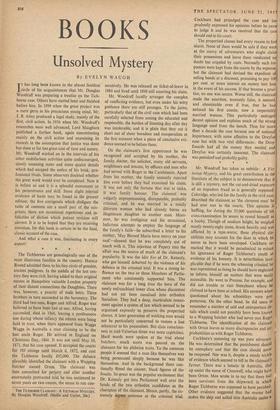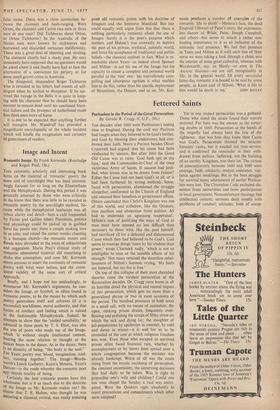BOOKS
Unsolved Mystery
By EVELYN WAUGH IF has long been known to the almost limitless 'circle of his acquaintances that Mr. Douglas Woodruff was preparing a treatise on the Tich- borne case. Others have started later and finished before him. In 1899 when the great project was a mere germ in his precocious young mind, Mr. J. B. Atlay produced a legal study, mainly of the first, civil action. In 1936 when Mr. Woodruff's researches were well advanced, Lord Maugham published a further book, again concentrating mainly on the civil action and examining its records in the assumption that justice was done but done at far too great cost of time and money. Mr. Woodruff worked on in the intervals of his other multifarious activities quite undiscouraged, slowly amassing more and more quaint details which had escaped the notice of his brisk, pro- fessional rivals. some observers doubted whether the great work would ever be completed. Now it is before us and it is a splendid monument to his perseverance and skill. Some slight internal evidence of haste may be found in the present edition; the five corrigenda which disfigure the table of contents are a small part of the mis- prints; there are occasional repetitions and in- felicities of diction which patient revision will correct. It is to be hoped that they are receiving attention, for this book is certain to be the final, classic account of the case.
And what a case it was, fascinating in every aspect!
The Tichbornes are genealogically one of the most illustrious families in the country. Horace Round admitted them to his tiny circle of genuine, ancient pedigrees. In the middle of the last cen- tury they were rich, having added to their original estates in Hampshire valuable London property of their distant connections the Doughties. There was, however, a paucity of male heirs. Three brothers in turn succeeded to the baronetcy. The third had two sons, Roger and Alfred. Roger was believed to have been lost at sea; Alfred, having succeeded, died in 1866, leaving a posthumous son during whose infancy the estates were being held in trust, when there appeared from Wagga Wagga in Australia a man claiming to be the lost uncle Roger. He arrived in England on Christmas Day, 1866. It was not until May 10, 1871, that his case opened. It occupied the courts for 103 sittings until March 6, 1872, and cost the Tichborne family £92,000. The defence plausibly identified the claimant with a Wapping butcher named Orton. The claimant was then committed for perjury and after another enormously protracted trial he was sentenced to seven years on two counts, the terms to run con- THE TICHBORNE CLAIMANT: A VICTORIAN MYSTERY, By Douglas Woodruff. (Hollis and Carter, 30s.) secutively. He was released on ticket-of-leave in 1884 and lived until 1898 still asserting his claim.
Mr. Woodruff lucidly arranges the complex of conflicting evidence, but even under his witty guidance there are stiff passages. To the juries, particularly that of the civil case which had been carefully selected from among the educated and responsible, the burden of listening day after day was intolerable, and it is plain that they cut it short out of sheer boredom and exasperation at the first moment when a piece of conclusive evi- dence seemed to be before them..
On the claimant's first appearance he was recognised and accepted by his mother, the family doctor, the solicitor, many old servants, neighbours and tenants, by officers and men who had served with Roger in the Carabineers. Apart from his mother, the family instantly rejected him even before they had examined his claim. It was not only the fortune that was at stake, it was family honour. The claimant was vulgarly unprepossessing, disreputable, probably criminal, and he was married to a totally illiterate woman who had already borne an illegitimate daughter to another man. More- over, he was irreligious and his occasional, ludicrous attempts to employ the language of the family's faith--he subscribed a letter to his mother, 'May Blessed Maria have mercy on your soul'—showed that he was completely out of touch with it. This injection of Popery into the affair was the source of much of the claimant's popularity. It was the idee Aye of Dr. Kenealy, who got himself debarred by the violence of his defence in the criminal trial. It was a strong in- fluence on the two or three Members of Parlia- ment who consistently supported him. The claimant was for a long time the hero of the newly enfranchised lower class whose discontent had not yet been canalised into orthodox Socialism. They had a deep, inarticulate resent- ment against a system of law which seemed to be organised expressly to preserve the propertied classes. A later generation of working men would not be particularly concerned to restore a lost aristocrat to his possessions. But class conscious- ness in mid-Victorian times was more capricious. Hard words were spoken at the trial about butchers; much scorn was poured on the claimant for his plebeian traits. To the common people it seemed that a man like themselves was being persecuted simply because he was like themselves. And in the background there con- tinually flitted the sinister, black figures of the Jesuits. So great was the popular excitement that Dr. Kenealy got into Parliament well over the heads of the two orthodox candidates as the champion of the claimant. Hence, partly, the ex- tremely seyere sentence at the criminal trial. Cockburn had prejudged the case and im- prudently expressed his opinions before he came to judge it and he was resolved that the case should end in his court.
The propertied classes had every reason to feel alarm. None of them would be safe if they were at the mercy of adventurers who might claim their possessions and leave them vindicated no doubt but crippled by costs. Normally such im- postors were kept from the courts by the expense, but the claimant had devised the expedient of selling bonds at a discount, promising to pay 100 per cent, or more interest on money lent him in the event of his success. If that became a prac- tice, no one was secure. Worse still, the claimant made the assertion, wantonly false, it seemed, and abominable even if true, that he had seduced his first cousin, now a respectably married woman. This particularly outraged decent opinion and explains much of the strong language used from the bench. Thus for more than a decade the case became one of national importance, with some affinities to the Dreyfus case but with two vital differences : the Drey- fusards had all the money they needed and Dreyfus was certainly innocent. The claimant was penniles/ and probably guilty.
Mr. Woodruff has taken as subtitle : A Vic- torian Mystery, and his great contribution to the literature of the subject is to demonstrate that it is still a mystery, not the cut-and-dried exposure of an impudent fraud as is generally supposed. Coleridge, who led for the family in the civil case, described the claimant as 'the cleverest man' he had ever met in the courts. This opinion is baffling, for during the 35,000 questions of his cross-examination he seems to reveal himself as a booby. Though of medium height, he weighed nearly twenty-eight stone, drank heavily and was afflicted by a tape-worm; these physical dis- abilities may account for the daze in which he seems to have been enveloped. Cockburn re- marked that it would be paradoxical to evince his ignorance of Roger Tichborne's youth a5 evidence of his honesty. It is nevertheless inex- plicable that if he were the scheming criminal he was represented as being he should have neglected to inform himself on matters that were easilY accessible. He went to Preston, for example, and did not trouble to visit Stonyhurst where he claimed to have been at school. His answers when questioned about his schooldays were pre- posterous. On the other hand, he did seem to remember a number of odd and unimportant de- tails which could not possibly have been known to a Wapping butcher who had never met Roger Tichborne. The identification of the claimant with Orton leaves as many discrepancies and inr probabilities as with Roger Tichborne.
Cockburn's summing up was pure advocacY- He was determined that the punishment should be exemplary and that the case should never be reopened. Nor was it, despite a steady trickle of evidence which seemed to tell in the claimant s favour. There was a lunatic in Australia, shut up under the name of Cresswell, who might have been Orton. Men wrote in to say that there had been survivors from the shipwreck in which Roger Tichborne was supposed to have perished. Other evidence suggested that the master had stolen the ship and sailed into Australia under a false name. There was a close connection be- tween the claimant and bush-ranging. Were Orton, the claimant and Castro two men or three men or one man? Did Tichborne shoot Orton, or Orton Tichborne? In the Australia of the Sixties men were known by nicknames and borrowed and discarded surnames indifferently. There was a great deal of shooting and stealing. The claimant clearly had a shady past. He may innocently have supposed that no questions would be asked about it and finally have had to face the alternative of a conviction for perjury or for some much graver crime in Australia.
The dissipated, despondent Roger Tichborne who is revealed in his letters had moods of self- disgust when he wished to disappear. If he sur- vived the voyage in the Bella it is quite in keep- ing with his character that he should have been content to remain dead until his continued finan- cial failure and the prospect of fatherhood made him think once more of home.
It is not to be expected. that anything further will transpire. Mr. Woodruff has provided a , magnificent encyclopedia of the whole incident which will kindle the imagination and curiosity of generations of readers.



































 Previous page
Previous page